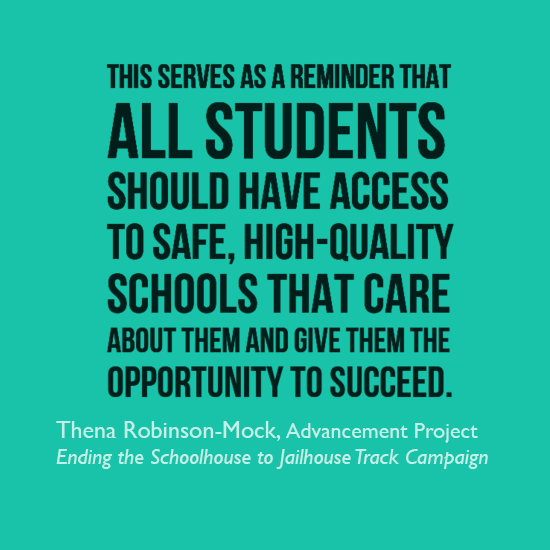Education Department: Civil Rights Laws Apply Equally to Charters
Resource type: News
Education Week | [ View Original Source (opens in new window) ]
By Evie Blad (cross-posted from Charters & Choice)
 The U.S. Department of Education’s Office for Civil Rights issued guidance today clarifying that charter schools have the same obligations to abide by federal civil rights laws as regular public schools. The “Dear Colleague” letter by Assistant Secretary for Civil Rights Catherine E. Lhamon includes specific guidance for charter schools related to admissions, students with disabilities, English-language learners, and discipline.
The U.S. Department of Education’s Office for Civil Rights issued guidance today clarifying that charter schools have the same obligations to abide by federal civil rights laws as regular public schools. The “Dear Colleague” letter by Assistant Secretary for Civil Rights Catherine E. Lhamon includes specific guidance for charter schools related to admissions, students with disabilities, English-language learners, and discipline.
In addition to those areas, charter schools should ensure their policies and practices comply with all federal civil rights law, including Title VI of the Civil Rights Act of 1964, which prohibits discrimination based on race, color, or national origin; Title IX of the Education Amendments of 1972, which prohibits discrimination based on sex; and Title II of the Americans with Disabilities Act of 1990, which prohibits discrimination based on disability, Lhamon wrote.
“I am writing to remind you that the Federal civil rights laws, regulations, and guidance that apply to charter schools are the same as those that apply to other public schools,” the letter says. “For this reason, it is essential that charter school officials and staff be knowledgeable about federal civil rights laws. These laws extend to all operations of a charter school, including recruiting, admissions, academics, educational services and testing, school climate (including prevention of harassment), disciplinary measures (including suspensions and expulsions), athletics and other nonacademic and extracurricular services and activities, and accessible buildings and technology.”
Admissions
Like all public schools, charter schools cannot discriminate in admissions on the basis of race, national origin, or disability status, Lhamon wrote. Because charter schools have choice-based admissions, leaders may need to make special considerations, the guidance says.
“Although public charter schools’ civil rights obligations are no different from those of other public schools in this regard, the fact that students choose to attend a charter school and are not simply assigned to attend a charter school underscores the need to be mindful of the rights of children and parents in the community when publicizing the school to attract students and when evaluating their applications for admission.”
That may mean printing materials so that parents of language-minority students can understand them, or providing interpreters or translating services. Charter schools must also avoid “admissions criteria that have the effect of excluding students on the basis of race, color, or national origin from the school without proper justification, and they cannot bar students from admission on the basis of disabilities, Lhamon wrote. In addition, charter schools must be in compliance with district desegregation plans.
Students With Disabilities
Every student enrolled in a charter school is entitled to a “free appropriate public education,” regardless of disability status, the guidance says. That means charters must provide appropriate evaluation and assessment; special aids, services, and programs; and equal opportunity to access non-academic and extracurricular activities, the guidance says.
English-Language Learners
Charter schools are given flexibility in how they address the needs of English-language-learner students, and they aren’t obligated to use one particular program or approach, the guidance says. But they must take “affirmative steps” to help English-language learners “overcome language barriers so that they can participate meaningfully in their schools’ educational programs.”
Discipline
The discipline guidance included in the charter school letter echoed more general federal guidance issued in January that called on schools to step back from zero-tolerance policies and to ensure that their policies and practices don’t have a “disparate impact” on students who have disabilities or are members of certain racial or ethnic groups.
Students from certain demographic groups—including black students, boys, and students with disabilities—continued to be disciplined at higher rates than their peers in the 2011-12 school year, national data from the U.S. Department of Education’s Civil Rights Data Collection released in March show.
Some critics of charter schools have said they haven’t made many of the same discipline changes that traditional schools have made in recent years. When Chicago schools recently boasted about a decline in suspensions, Catalyst Chicago pointed out that the district does not collect such data for charter schools.
Advancement Project is a grantee of Atlantic’s Children & Youth programme in the United States, which funds efforts to reform school discipline policies.